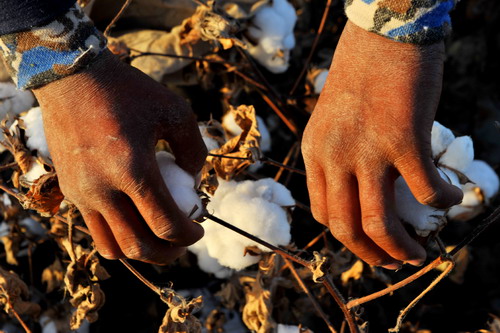Harsh harvest looms for Xinjiang cotton growers
Updated: 2011-10-11 13:31
By Shao Wei (China Daily)
|
|||||||||||
|
 Cotton is harvested in the traditional way in Kurla, the Xinjiang Uygur autonomous region, in November. [Photo/China Daily] |
|
|
If you drive around Shihezi now, cotton harvest time, you will probably notice that the cotton fields look as if snow has just fallen.
However, the fields should also be filled with people picking cotton. In a few years machines will do much of the work but until then harvesting requires thousands of workers.
"I've been desperately looking for migrant cotton pickers at the railway and bus stations, but in vain," cotton farmer Li Chunsheng said in September. On Sunday, he said nothing had changed.
Li, 53, cultivates four hectares of cotton in Manas county, Changji Hui autonomous prefecture. The county, about 17 kilometers from Shihezi, is the key production area for first-rate cotton in the northern part of the Xinjiang Uygur autonomous region.
The seasonal pickers "ask for higher pay this year, while the cotton price is lower than last year. We can't make ends meet", he said.
Labor costs rose from 1.4 yuan (20 US cents) last year for every kilogram of cotton picked to at least 2 yuan this year, an increase of about 40 percent.
The price of cotton, meanwhile, has dropped from 10.8 yuan a kilogram last year to 8.4 yuan, a drop of 22 percent.
"I'll make no money from cotton this year," Li said without hesitation.
By mid-September, the outlook was already bleak.
One Friday afternoon, about 150 cotton growers, most from nearby Manas and Shawan counties, milled about outside the railway station, waiting to bargain with migrant workers. A train from the Ningxia Hui autonomous region arrived about 3 pm, and the growers thronged the workers as they stepped out the exit.
Ding Yonghua, who has eight hectares of cotton fields in Shawan county, elbowed into the crowd. She didn't ask the labor price from He Rubo, who had brought 40 laborers from Guyuan, but instead grabbed his luggage.
"Come with me and bring your fellows," Ding yelled. "Cotton in my field has a good harvest. And I can pay you 2.2 yuan a kilogram, free transportation and accommodation."
"That's too low - 2.4 yuan, and a 2,000-yuan salary to our cook," He said, snatching back his luggage.
Ding quit. "If I give him that payment, I will earn no money from my cotton fields and could even lose at least 15,000 yuan."
She devoted only two hectares to cotton in 2010 but, stimulated by the record high cotton price last year, Ding planted all of her contracted eight hectares in cotton this year.
"I never thought a whole year of farmwork would gain nothing," she said. "Without cotton, my family has no source of income."
Back-breaking labor
"Cotton picking is arduous work. The fields are hot and days are long. You have to keep your back bent, bear the pricks of the cotton boll clusters in the skin around your fingernails, haul a 100-odd-kg cotton sack and head to the fields, back and forth," said Li Yugong, a regular hand and labor contractor from Nanyang, Henan province.
The 46-year-old has seven years' experience taking Henan laborers to Xinjiang. Finding enough hands has become "very difficult".
"For most people in inland China, Xinjiang is a far, remote and unknown place," he said. "Some have concerns and even misunderstandings about the long journey, intensive labor and personal security, which makes them unwilling to come."
Li Yugong brought only 40 workers from his hometown to pick cotton for a farm of the Xinjiang Production and Construction Corps (XPCC) near Shihezi. Most of the pickers are women in their 40s and 50s.
"Only this age group is happy to do farm work in Xinjiang," Li said. "Cotton picking is low-skilled, and suitable to these people who are unemployed, lack education and working experience in factories, and are willing to endure hardship in the fields."
Related Stories
China's cotton import down 13.8% in Aug 2011-10-08 09:11
China launches temporary cotton reserve 2011-09-09 09:57
Cotton production set to rise for first time in four years 2011-08-26 10:56
China July cotton imports up 30.89% from June 2011-08-11 11:40
- Transport data raise privacy concerns
- Regulator to review Beijing Jingkelong IPO
- City govt fails to clean up pollution
- Letter calls Gucci stores 'sweat shops'
- City's Wal-Marts to close for 15 days
- China IPOs shrink to two-year low in Q3
- Oil, gas tax rate moves to value base
- CSR to build Melbourne HQ














